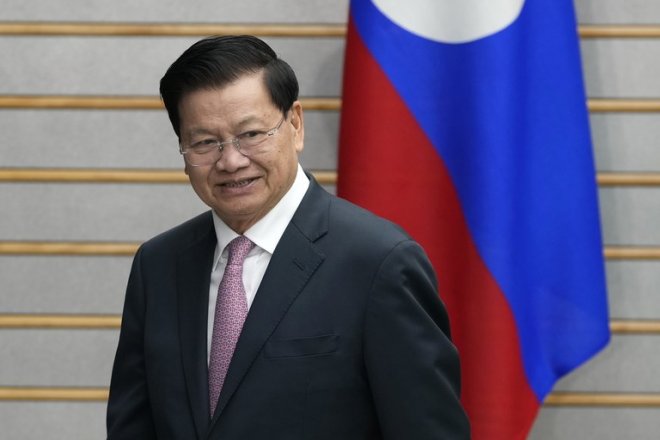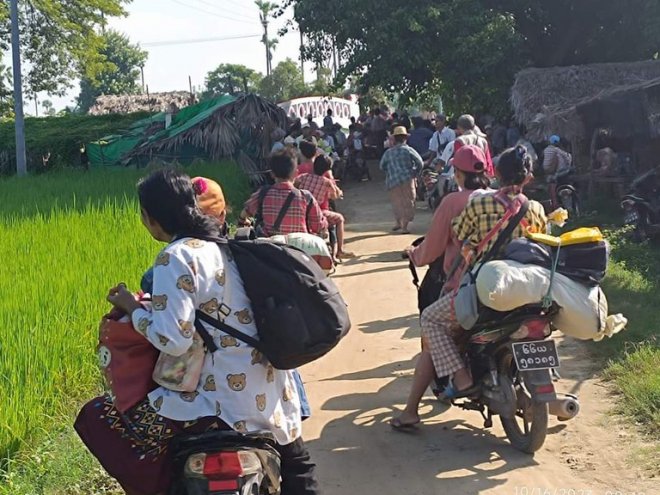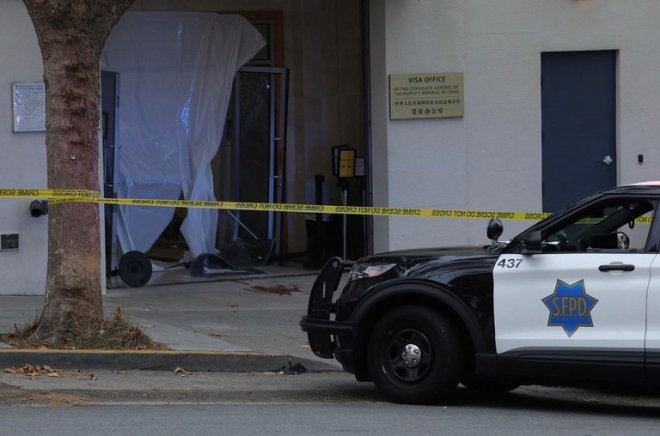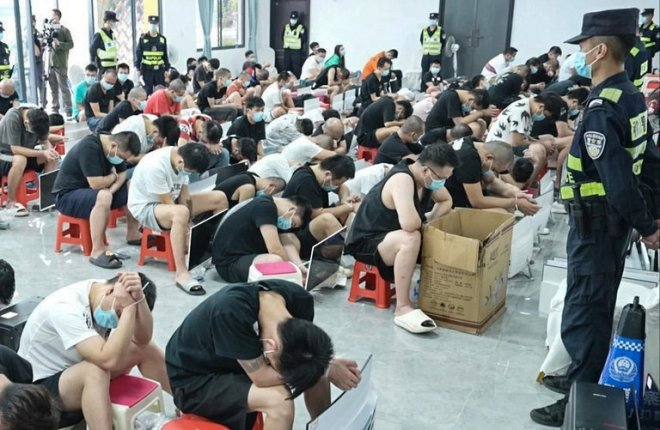China braces for second COVID wave amid public doubts over homegrown vaccines
Chinese experts are warning of a mounting wave of COVID-19 cases, but face ongoing public distrust that homegrown vaccines targeting the XBB Omicron variants will do much to protect people against severe disease or death.
The country’s top respiratory disease expert Zhong Nanshan warned this week that the number of infections will likely reach 40 million a week, rising to a peak of 65 million a week by the end of June.
China recently approved two new vaccines targeting XBB variants, Zhong told the 2023 Greater Bay Area Science Forum in the southern city of Guangzhou on Monday, with three or four new jabs in the pipeline and likely to be approved soon.
More than 80% of new infections in China are now caused by the XBB strain of the Omicron variant of COVID-19, state media quoted the China Center for Disease Control and Prevention as saying, and the proportion continues to rise.
China"s National Health Commission has warned that the XBB strains have greater transmissibility and immune escape than earlier strains of Omicron, with no significant change in its ability to cause severe initial disease.
![]() China"s top respiratory disease expert Zhong Nanshan has warned that COVID infections in the country likely will peak at 65 million a week by the end of June. Credit: AFP file photo
China"s top respiratory disease expert Zhong Nanshan has warned that COVID infections in the country likely will peak at 65 million a week by the end of June. Credit: AFP file photo
But Chinese Academy of Sciences expert Gao Fu said there is also the threat of long COVID and sequelae caused by the virus, especially as reports are emerging of high proportions of reinfections in Chinese hospitals, the Global Times reported.
"The more times an individual is infected with COVID-19, the higher the risk of sequelae people will face," the English-language Global Times newspaper quoted Gao as telling an infectious diseases research conference on May 13.
The long-term effects – or sequelae – of COVID-19 infection are "a basic fact" that people shouldn"t shy away from, Gao told the conference.
"We can"t be afraid of COVID but we also can"t make light of it," he said.
Links to other diseases
Recent studies have shown a link between COVID-19 infection and heart damage, Type 1 and 2 diabetes, cognitive deficits, as well as chronic fatigue and postural tachycardia reported by long COVID sufferers, including children.
While many studies suggest there are higher risks for those who aren"t vaccinated, others say organ damage has been seen even after "mild" initial illness.
![]() Mourners stand outside crematorium as white smoke pours out of chimneys used for cremation in Beijing, Dec. 31, 2022. Credit: Associated Press
Mourners stand outside crematorium as white smoke pours out of chimneys used for cremation in Beijing, Dec. 31, 2022. Credit: Associated Press
The World Health Organization estimated recently that one in 10 cases of COVID-19 could lead to long-term care needs.
Zhong also warned in comments reported in the Global Times on May 15 that while antibodies from an earlier infection once provided protection against reinfection for up to six months, the XBB was able to escape immunity from infection, and it is now nearly six months since China"s initial wave of infections.
The paper cited hospital officials as saying that around 40% of recent cases at the Shenzhen No. 3 People’s Hospital were reinfections.
Experts estimate that the initial wave of Omicron that followed the lifting of three years of lockdowns, compulsory testing and mass quarantines under Chinese leader Xi Jinping"s zero-COVID policy likely infected up to 1.2 billion people in China.
Crematoriums overwhelmed
As the first wave hit an undervaccinated population, funeral homes and crematoriums were working round the clock to deal with a massive wave of deaths, as a U.K.-based computer model estimated that as many as 36,000 people died each day during the Lunar New Year holiday period in February, with cases peaking at 4.8 million a day.
Yanzhong Huang, a senior researcher on global health issues at the Council on Foreign Relations in Washington DC, took the government"s own figures on cases and the official projected death rate to come up with a likely death toll of at least one million during the first wave of infections, in an article in Foreign Policy magazine on Feb. 16.
Huang told Radio Free Asia this week that he doesn"t expect the current wave to be so deadly, although he didn"t explain why, given ongoing concerns over vaccine uptake in China, partly due to mistrust of homegrown jabs.
![]() People shout slogans and hold up blank sheets of paper during a protest against COVID-19 restrictions after a vigil for the victims of a fire in Urumqi, in Beijing, Nov. 28, 2022. Credit: Reuters
People shout slogans and hold up blank sheets of paper during a protest against COVID-19 restrictions after a vigil for the victims of a fire in Urumqi, in Beijing, Nov. 28, 2022. Credit: Reuters
"I don"t know yet whether this new vaccine is effective against XBB," Huang said. "I think vaccination is definitely necessary, but I don"t think we should overstate how effective [these vaccines] will be."
"The vaccines are mostly effective against severe disease, so regarding them as preventive [of infection] isn"t very accurate."
But he said of the current wave: "It"ll probably be milder, with less of a socioeconomic impact."
Chinese-language comments on Twitter hit out at homegrown COVID-19 vaccines, saying three jabs had done little to protect anyone during the last wave, with some saying they were "still recovering" from the last jab.
Ren Ruihong, a former executive of the China Red Cross Foundation, said Chinese-made inactivated virus vaccines are generally regarded by the international scientific community as less effective than the mRNA jabs produced in Europe and the United States.
"Most of my friends and relatives aren"t very impressed [by the approval of new vaccines]," Ren said. "They didn"t think the original vaccine did much good the first time around."
"We were told at the time that it protected against severe disease, but most of them still got seriously ill anyway."
Ren added: "The newly updated vaccine is still the original inactivated type, so it probably won"t be much of an improvement."
Huang called on the authorities to lay in more stores of antiviral medicines and encourage vaccination and mask-wearing, rather than returning to lockdowns and mass quarantine restrictions.
Ren said zero-COVID measures are unlikely to return, however, given that local governments have no funds to implement them, citing the ruling Chinese Communist Party"s unwillingness to provoke public protests similar to the "white paper" protests of November 2022.
Translated by Luisetta Mudie. Edited by Malcolm Foster.
[圖擷取自網路,如有疑問請私訊]
The country’s top respiratory disease expert Zhong Nanshan warned this week that the number of infections will likely reach 40 million a week, rising to a peak of 65 million a week by the end of June.
China recently approved two new vaccines targeting XBB variants, Zhong told the 2023 Greater Bay Area Science Forum in the southern city of Guangzhou on Monday, with three or four new jabs in the pipeline and likely to be approved soon.
More than 80% of new infections in China are now caused by the XBB strain of the Omicron variant of COVID-19, state media quoted the China Center for Disease Control and Prevention as saying, and the proportion continues to rise.
China"s National Health Commission has warned that the XBB strains have greater transmissibility and immune escape than earlier strains of Omicron, with no significant change in its ability to cause severe initial disease.
 China"s top respiratory disease expert Zhong Nanshan has warned that COVID infections in the country likely will peak at 65 million a week by the end of June. Credit: AFP file photo
China"s top respiratory disease expert Zhong Nanshan has warned that COVID infections in the country likely will peak at 65 million a week by the end of June. Credit: AFP file photoBut Chinese Academy of Sciences expert Gao Fu said there is also the threat of long COVID and sequelae caused by the virus, especially as reports are emerging of high proportions of reinfections in Chinese hospitals, the Global Times reported.
"The more times an individual is infected with COVID-19, the higher the risk of sequelae people will face," the English-language Global Times newspaper quoted Gao as telling an infectious diseases research conference on May 13.
The long-term effects – or sequelae – of COVID-19 infection are "a basic fact" that people shouldn"t shy away from, Gao told the conference.
"We can"t be afraid of COVID but we also can"t make light of it," he said.
Links to other diseases
Recent studies have shown a link between COVID-19 infection and heart damage, Type 1 and 2 diabetes, cognitive deficits, as well as chronic fatigue and postural tachycardia reported by long COVID sufferers, including children.
While many studies suggest there are higher risks for those who aren"t vaccinated, others say organ damage has been seen even after "mild" initial illness.
 Mourners stand outside crematorium as white smoke pours out of chimneys used for cremation in Beijing, Dec. 31, 2022. Credit: Associated Press
Mourners stand outside crematorium as white smoke pours out of chimneys used for cremation in Beijing, Dec. 31, 2022. Credit: Associated PressThe World Health Organization estimated recently that one in 10 cases of COVID-19 could lead to long-term care needs.
Zhong also warned in comments reported in the Global Times on May 15 that while antibodies from an earlier infection once provided protection against reinfection for up to six months, the XBB was able to escape immunity from infection, and it is now nearly six months since China"s initial wave of infections.
The paper cited hospital officials as saying that around 40% of recent cases at the Shenzhen No. 3 People’s Hospital were reinfections.
Experts estimate that the initial wave of Omicron that followed the lifting of three years of lockdowns, compulsory testing and mass quarantines under Chinese leader Xi Jinping"s zero-COVID policy likely infected up to 1.2 billion people in China.
Crematoriums overwhelmed
As the first wave hit an undervaccinated population, funeral homes and crematoriums were working round the clock to deal with a massive wave of deaths, as a U.K.-based computer model estimated that as many as 36,000 people died each day during the Lunar New Year holiday period in February, with cases peaking at 4.8 million a day.
Yanzhong Huang, a senior researcher on global health issues at the Council on Foreign Relations in Washington DC, took the government"s own figures on cases and the official projected death rate to come up with a likely death toll of at least one million during the first wave of infections, in an article in Foreign Policy magazine on Feb. 16.
Huang told Radio Free Asia this week that he doesn"t expect the current wave to be so deadly, although he didn"t explain why, given ongoing concerns over vaccine uptake in China, partly due to mistrust of homegrown jabs.
 People shout slogans and hold up blank sheets of paper during a protest against COVID-19 restrictions after a vigil for the victims of a fire in Urumqi, in Beijing, Nov. 28, 2022. Credit: Reuters
People shout slogans and hold up blank sheets of paper during a protest against COVID-19 restrictions after a vigil for the victims of a fire in Urumqi, in Beijing, Nov. 28, 2022. Credit: Reuters"I don"t know yet whether this new vaccine is effective against XBB," Huang said. "I think vaccination is definitely necessary, but I don"t think we should overstate how effective [these vaccines] will be."
"The vaccines are mostly effective against severe disease, so regarding them as preventive [of infection] isn"t very accurate."
But he said of the current wave: "It"ll probably be milder, with less of a socioeconomic impact."
Chinese-language comments on Twitter hit out at homegrown COVID-19 vaccines, saying three jabs had done little to protect anyone during the last wave, with some saying they were "still recovering" from the last jab.
Ren Ruihong, a former executive of the China Red Cross Foundation, said Chinese-made inactivated virus vaccines are generally regarded by the international scientific community as less effective than the mRNA jabs produced in Europe and the United States.
"Most of my friends and relatives aren"t very impressed [by the approval of new vaccines]," Ren said. "They didn"t think the original vaccine did much good the first time around."
"We were told at the time that it protected against severe disease, but most of them still got seriously ill anyway."
Ren added: "The newly updated vaccine is still the original inactivated type, so it probably won"t be much of an improvement."
Huang called on the authorities to lay in more stores of antiviral medicines and encourage vaccination and mask-wearing, rather than returning to lockdowns and mass quarantine restrictions.
Ren said zero-COVID measures are unlikely to return, however, given that local governments have no funds to implement them, citing the ruling Chinese Communist Party"s unwillingness to provoke public protests similar to the "white paper" protests of November 2022.
Translated by Luisetta Mudie. Edited by Malcolm Foster.
[圖擷取自網路,如有疑問請私訊]
|
本篇 |
不想錯過? 請追蹤FB專頁! |
| 喜歡這篇嗎?快分享吧! |
相關文章
AsianNewsCast

















